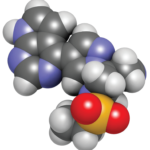In this study, researchers set out to determine the prevalence of baseline risk factors for cardiovascular outcomes and cancer among commercially insured patients with rheumatoid arthritis during their first dispensed treatment.
Search results for: inhibitor

When a JAK Inhibitor Fails
What Are the Therapeutic Alternatives When a Janus Kinase Inhibitor Fails to Work? SAN DIEGO—Treatment alternatives after Janus kinase (JAK) inhibitor failure in real-life conditions were analyzed and presented at ACR Convergence 2023 by Pablo Francisco Muñoz Martínez, a rheumatologist at the Hospital Universitario y Politécnico La Fe, Sagunto, Spain.1 JAK inhibitors are newer, targeted…

Pregnancy Outcomes in Patients Treated with TNF Inhibitors
A study found the continuation of tumor necrosis factor inhibitor (TNFi) treatment in patients with chronic rheumatic inflammatory diseases after pregnancy diagnosis was not associated with worse outcomes than those who discontinued treatment with TNFi’s.

Can SGLT2 Inhibitors Protect Our SLE Patients?
SAN DIEGO—At ACR Convergence 2023, Plenary Session 2, April M. Jorge, MD, shared data concerning the potential cardio- and renal-protective benefits of sodium-glucose co-transporter-2 inhibitors in patients with systemic lupus erythematosus and lupus nephritis.

A Dual Inhibitor Treatment for RA?
TLL-018, a Janus kinase 1/tyrosine kinase 2 inhibitor, proved more effective for treating patients with RA than tofacitinib, according to a study by Zeng et al.

JAK Inhibitors vs. TNF Inhibitors: Understanding Infection Risks
Research from Choi et al. provides insights into the risk of infection in patients with rheumatoid arthritis (RA), comparing patients treated with Janus kinase inhibitors vs. tumor necrosis inhibitors. The most frequent infection was herpes zoster, with patients treated with JAK inhibitors having a significantly greater risk of herpes zoster infection than those treated with TNF inhibitors.

TNF Inhibitors Associated with Neurological Adverse Events
A study examined the association between TNF inhibitors and neurological demyelinating adverse events in patients with rheumatoid arthritis and spondyloarthritis using cohort data from five Nordic countries. Researchers showed that patients with SpA were more likely to experience adverse events than patients with RA.

JAK Inhibitors: Are All Promises Fulfilled?
A decade after JAK inhibitors were approved, this EULAR 2022 session looks at whether the drugs have lived up to expectations.

Early Data on Novel MK2 Inhibitor to Treat Inflammatory Diseases Promising
In a small preliminary study, the novel MK2 inhibitor, CC-99677, was safe and well tolerated by healthy participants. With daily dosing, the agent sustained reductions of tumor necrosis factor alpha and other cytokines for 14 days.

Risk of Adverse Outcomes Due to COVID-19 May Be Lower with TNF Inhibitor Monotherapy
Findings support the continued use of TNF inhibitor monotherapy in individuals with immune-mediated inflammatory diseases. In the study, these patients had a lower risk of hospitalization or death caused by COVID-19 than patients on other commonly prescribed treatment regimens
- 1
- 2
- 3
- …
- 119
- Next Page »